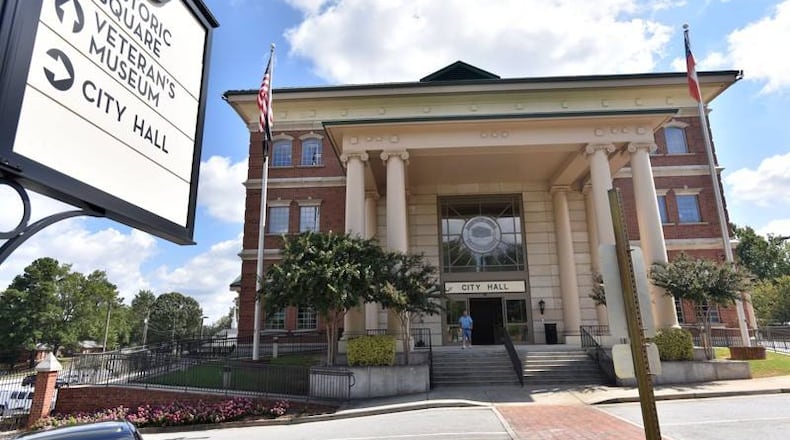About 250 people who live in an extended-stay hotel in Lawrenceville will soon need to find a new place to call home, as the city moves to buy and redevelop the property near Ga. 316.
It will become the second long-term hotel Lawrenceville has bought with taxpayer dollars since 2020 to close them down. “This is just a humane way to assist people,” Mayor David Still said. “I’m not apologetic (about) helping people get into a better place in the community.”
City Council unanimously agreed Monday to purchase the Metro Extended Stay hotel at 652 Buford Drive using $7.2 million in bonds. It also approved an agreement to pay Impact46, a Lawrenceville-based nonprofit, $750,000 to help hotel guests find new homes.
Some residents in the 131-room hotel have lived there for five years or longer. Guests will begin moving out in September before the hotel closes in November.
Gwinnett County has long struggled to provide services to its homeless population or those living in their cars or hotels. Many who are on the verge of having nowhere to stay seek refuge in one of the approximately 55 extended-stay motels and hotels in the county.
Impact46, which operates as the Lawrenceville Response Center with other partners, focuses on homelessness prevention, income loss recovery, utilities assistance and food distribution.
As it has done when Lawrenceville previously bought and closed properties, the nonprofit will connect guests with employers and places for permanent or temporary housing, said Executive Director Jen Young.
The extended-stay hotel, like others, has experienced “a lot of crime issues,” Still said. He claims that the purchase will save taxpayers money in the long-run by foregoing the need to send resources, like police, out to the hotel.
Lodge Development, an Atlanta-based hotel management company, planned to sell the property regardless of the city’s interest in it, Still said. The city saw it as an opportunity to get the guests at the hotel into actual homes and bring redevelopment to an area that’s attractive for growth, he said.
It’s still unclear how the city will use the land, Still said, but he’d prefer businesses with high-paying jobs to be built on the property.
Hotel guests will have to meet quite a few requirements set by apartment associations to find permanent housing. According to Young, requirements include having a full-time job that pays a livable wage, four to six paystubs, savings for at least two months of rent, reliable transportation and no previous criminal or eviction history.
Impact46 will provide career coaching and connect the hotel guests with employers so they can meet those rental requirements, Young said. It will host an employment prep workshop in August and two hiring events in August and September with employers offering at least $16 an hour.
“For some of them, this will be a really great opportunity. And for others, it’ll be a season to rethink, ‘What does housing look like for me?’” Young said. “We’re there to answer any questions and walk alongside them the entire way, providing resources with finances as well as employment.”
For those with criminal or eviction history, there will be some “second-chance” housing available, Young said.
People who live in the extended-stay must make do with a microwave and mini fridge as opposed to an actual kitchen, Still said. The move will allow them to pay less per month while living in a nicer place, he said.
Guests at extended-stays typically pay anywhere from $1,400-$1,700 each month, Young said. They could pay as low as $1,200 per month for their new homes, she said.
The city bought the Villa Lodge and Suites hotel on West Crogan Street and demolished it in 2020. Permanent housing was found for 25% of the guests, though others applied but didn’t qualify due to lack of employment, according to a Lawrenceville report. And 22% of guests were prevented from finding permanent housing due to having a criminal history.
The city also previously purchased a small apartment complex on North Clayton Street. It reported 43% of guests there were successfully moved into permanent housing.
Neither of the properties have been redeveloped, though the city has received interest from developers to build on the Villa Lodge property.
Each hotel guest will be responsible for finding housing, Young said, and it’s not required to work with Impact46. But the nonprofit will help guide them through the process, she said.
The city will consider the relocation of guests from Metro Extended Stay a success if at least 35% move into permanent housing with full-time employment and adequate savings and only 5% relocate to another local extended stay, according to a document.
Guests also will be given relocation stipends to cover three months’ worth of rent. The city will aim for 30% of guests take the stipend and relocate out of Lawrenceville but stay in Gwinnett County.
Officials will consider it a successful rehousing if 30% of people move into temporary housing with a job, albeit with little savings.
There are currently at least five extended-stay hotels in Lawrenceville, Still said.
“I would tell you as mayor that we do have too many extended-stays,” Still said. “It creates a problem with concentrated poverty, and it puts children in jeopardy to be able to get out of the ditch. We’re trying to fix it so that we can get these families in better living quarters.”
About the Author


